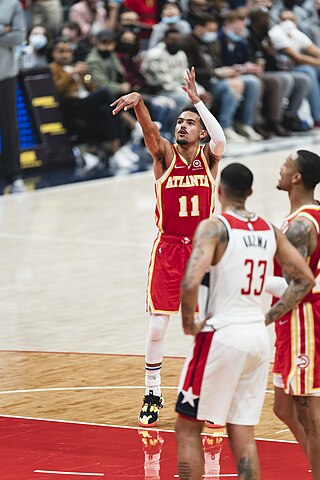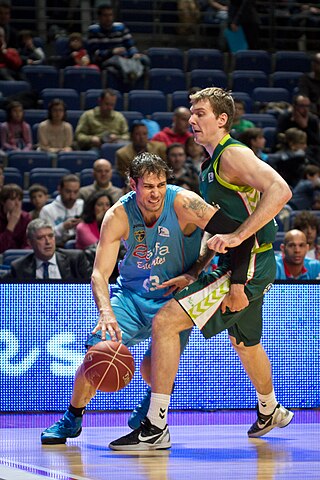
A penalty kick is a method of restarting play in association football, in which a player is allowed to take a single shot at the goal while it is defended only by the opposing team's goalkeeper. It is awarded when an offence punishable by a direct free kick is committed by a player in their own penalty area. The shot is taken from the penalty spot, which is 11 metres from the goal line and centered between the touch lines.
Dead ball is a term in many ball sports in which the ball is deemed temporarily not playable, and no movement may be made with it. Depending on the sport, this event may be quite routine, or more uncommon.

Gamesmanship is the use of dubious methods to win or gain a serious advantage in a game or sport. It has been described as "Pushing the rules to the limit without getting caught, using whatever dubious methods possible to achieve the desired end". It may be inferred that the term derives from the idea of playing for the game as opposed to sportsmanship, which derives from the idea of playing for sport. The term was popularized by Stephen Potter's humorous 1947 book, The Theory and Practice of Gamesmanship . It had, however, been used before by Ian Coster in his autobiographic book Friends in Aspic, published in 1939, where it was attributed to Francis Meynell.
In basketball, a technical foul is any infraction of the rules penalized as a foul which does not involve physical contact during the course of play between opposing players on the court, or is a foul by a non-player. The most common technical foul is for unsportsmanlike conduct. Technical fouls can be assessed against players, bench personnel, the entire team, or even the crowd. These fouls, and their penalties, are more serious than a personal foul, but not necessarily as serious as a flagrant foul.

In basketball, free throws or foul shots are unopposed attempts to score points by shooting from behind the free-throw line, a line situated at the end of the restricted area. Free throws are generally awarded after a foul on the shooter by the opposing team, analogous to penalty shots in other team sports. Free throws are also awarded in other situations, including technical fouls, and when the fouling team has entered the bonus/penalty situation. Also, depending on the situation, a player may be awarded between one and three free throws. Each successful free throw is worth one point.

In basketball, a personal foul is a breach of the rules that concerns illegal personal contact with an opponent. It is the most common type of foul in basketball. A player fouls out on reaching a limit on personal fouls for the game and is disqualified from participation in the remainder of the game.
In various sports, a professional foul is a deliberate act of foul play intended to bring about an advantage for the perpetrator's team. Professional fouls are usually committed to prevent an opponent from scoring.

The rules of basketball are the rules and regulations that govern the play, officiating, equipment and procedures of basketball. While many of the basic rules are uniform throughout the world, variations do exist. Most leagues or governing bodies in North America, the most important of which are the National Basketball Association and NCAA, formulate their own rules. In addition, the Technical Commission of the International Basketball Federation (FIBA) determines rules for international play; most leagues outside North America use the complete FIBA ruleset.
In basketball, a flop is an intentional fall or stagger by a player, after little or no physical contact by an opponent, to induce an official to call a personal foul on the opponent. The move is sometimes called acting, as in "acting as if he were fouled". Because it is inherently designed to deceive the official, flopping is considered unsportsmanlike, but it is widely practiced. The player who commits the act is called a flopper.

In sports, an ejection is the removal of a participant from a contest due to a violation of the sport's rules. The exact violations that lead to an ejection vary depending upon the sport, but common causes for ejection include unsportsmanlike conduct, violent acts against another participant that are beyond the sport's generally accepted standards for such acts, abuse against officials, violations of the sport's rules that the contest official deems to be egregious, or the use of an illegal substance to better a player's game. Most sports have provisions that allow players to be ejected, and many allow for the ejection of coaches, managers, or other non-playing personnel. In sports that use penalty cards, a red card is often used to signal dismissals. In some sports, another player is permitted to enter the game in place of the player who has been ejected, but in others the team is required to continue the game with a reduced number of players.

In the sport of association football, fouls and misconduct are acts committed by players which are deemed by the referee to be unfair and are subsequently penalised. An offence may be a foul, misconduct or both depending on the nature of the offence and the circumstances in which it occurs. Fouls and misconduct are addressed in Law 12 of the Laws of the Game. A foul is an unfair act by a player, deemed by the referee to contravene the game's laws, that interferes with the active play of the match. Fouls are punished by the award of a free kick to the opposing team. A list of specific offences that can be fouls are detailed in Law 12 of the Laws of the Game ; these mostly concern unnecessarily aggressive physical play and the offence of handling the ball. An infringement is classified as a foul when it meets all the following conditions:
- It is committed by a player ;
- It occurs on the field of play;
- It occurs while the ball is in play;
- It is committed against an opponent.
In sports strategy, running out the clock is the practice of a winning team allowing the clock to expire through a series of preselected plays, either to preserve a lead or hasten the end of a one-sided contest. Such measures expend time but do not otherwise have a tactical purpose. This is usually done by a team that is winning by a slim margin near the end of a game, in order to reduce the time available for the opposing team to score. Generally, it is the opposite strategy of running up the score.

In basketball, a flagrant foul is a personal foul that involves excessive or violent contact that could injure the fouled player. A flagrant foul may be unintentional or purposeful; the latter type is also called an "intentional foul" in the National Basketball Association (NBA). However, not all intentional fouls are flagrant fouls, as it is an accepted strategy to intentionally commit a foul in order to regain possession of the ball while minimizing how much time elapses on the game clock.

In basketball, a foul is an infraction of the rules more serious than a violation. Most fouls occur as a result of illegal personal contact with an opponent and/or unsportsmanlike behavior. Fouls can result in one or more of the following penalties:

Penalty cards are used in many sports as a means of warning, reprimanding or penalising a player, coach or team official. Penalty cards are most commonly used by referees or umpires to indicate that a player has committed an offence. The official will hold the card above their head while looking or pointing toward the player who has committed the offence. This action makes the decision clear to all players, as well as spectators and other officials in a manner that is language-neutral. The colour or shape of the card used by the official indicates the type or seriousness of the offence and the level of punishment that is to be applied. Yellow and red cards are the most common, typically indicating, respectively, cautions and dismissals.

Unsportsmanlike conduct is a foul or offense in many sports that violates the sport's generally accepted rules of sportsmanship and participant conduct. Examples include verbal abuse, taunting of an opponent or a game official, an excessive celebration following a significant play, or feigning injury. The official rules of many sports include a general provision whereby participants or an entire team may be penalized or otherwise sanctioned for unsportsmanlike conduct.
Delay of game is an action in a sports game in which a player or team deliberately stalls the game, usually with the intention of using the delay to its advantage. In some sports, the delay of game is considered an infraction if it is longer than that permitted according to the game's rules, in which case a penalty can be issued. Some sports that have a delay of game penalty are American football, Canadian football, ice hockey and association football.

In gridiron football, a penalty is a sanction assessed against a team for a violation of the rules, called a foul. Officials initially signal penalties by tossing a bright yellow colored penalty flag onto the field toward or at the spot of a foul.

In the sport of basketball, the bonus situation occurs when one team accumulates a requisite number of fouls, the number of which varies depending on the level of play. When one team has committed the requisite number of fouls, each subsequent foul results in the opposing team's taking free throws regardless of the type of foul committed. Teams under the limit are commonly referred to as having fouls to give, and thus they can try to disrupt their opponents without being penalized free throws. These fouls reset every quarter or half depending on the rules in use.
In American football, an unfair act is a foul that can be called when a player or team commits a flagrant and obviously illegal act that has a major impact on the game, and from which, if additional penalties were not enforced, the offending team would gain an advantage.













